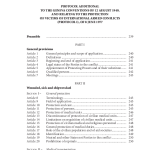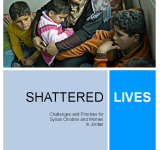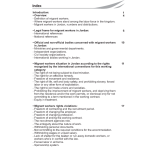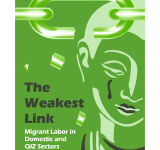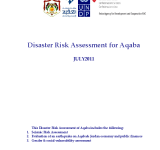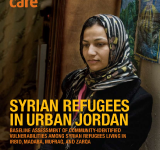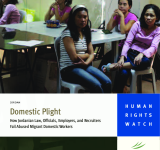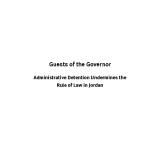shelter
With an executive summary on the Syrian refugees situation in Jordan;; the report combines the conclusions of detailed assessments in various areas including as child protection and gender-based violence;; education;; water sanitation and hygiene;; and nutrition and health. It provides a holistic picture of the situation faced by Syrian children and women in Jordan to draw out recommendations for necessary plans of action. Some key findings of the report include growing challenges for water;; sanitation and hygiene situation in Za’atari camp;; several threats to the nutritional status and health of Syrian girls;; boys and women and increasing violence against adolescents. Bringing together the voices of children and women at the camps;; the report examines the situations of Syrian refugees in host communities and refugee camps and finds key recommendations based on them.
The migrant worker in Jordan situation report was issued in 2009. It presents an overview of the situation of migrant workers in Jordan and the main violations they are subject to. Additionally;; the report offers recommendations to national and international parties concerned with the migrant workers' rights.
This report is the second annual report of Tamkeen Center for Legal Aid and Human Rights. It addresses the status of both migrant domestic workers and migrant workers in Qualified Industrial Zones because these two categories are subject to recurrent abuses and are the most vulnerable group due to legislative reasons;; administrative practices and the actions of their employers.
This evaluation uses the findings of the seismic risk assessment (Jordan Royal Scientific Society) in order to provide a comprehensive overview of the costs of an earthquake impacting mainly Aqaba city and slightly in the southern area close to the Jordan‐Saudi border. It only considers an earthquake occurring under the Aqaba Fault System with a maximum magnitude of 7.5 Mw.
This report is a baseline assessment of community-identified vulnerabilities among Syrian refugees living in Amman;; Irbid;; Madaba;; Mufraq;; and Zarqa. The purpose of this report is to identify urban Syrian refugees’ current coping mechanisms and any gaps in services available to Syrian refugees in Jordan. The research methodology is both qualitative and participatory in design;; drawing from the UNHCR tool for Participatory Assessment in Operations. This report presents only the data from household interviews;; baseline assessment;; and the follow-up focus groups conducted with community members. The number of households surveyed was 240;; with a total number of 1;;476 household members and 89 focus group participants representing 534 household members. The report proposed general recommendations and interventions to deal with the main highlighted challenges (cash assistance;; strengthening community links;; vocational training;; physical activities ...etc).
يوثّق التقرير الانتهاكات القائمة بحق عاملات المنازل;; وإخفاق المسؤولين الأردنيين في محاسبة أرباب العمل ومكاتب الاستقدام التي تستقدم العاملات. كما ينتقد التقرير قوانين الهجرة وقوانين العمل المنزلي التي تيسّر وقوع الانتهاكات;; من قبيل تحديد الإقامة قسراً في البيت وفرض غرامات على تجاوز مدد الإقامة القانونية;; حتى إن لم تكن العاملة هي السبب في التجاوز.
يقدم هذا التقرير المكون من 56 صفحة تفصيلاً حول كيفية قيام المحافظين وغيرهم من المسؤولين بالالتفاف حول أصول المحاكمات الجزائية;; وذلك عند احتجازهم اشخاص بموجب أمر اداري (الاحتجاز الاداري) دون مراجعة قضائية. وكما يبين الممارسات المستخدمة ضد ضحايا الجريمة;; وأعداء الشخصية والأشخاص الذين تم اخلاء سبيلهم من قبل المحاكم.
